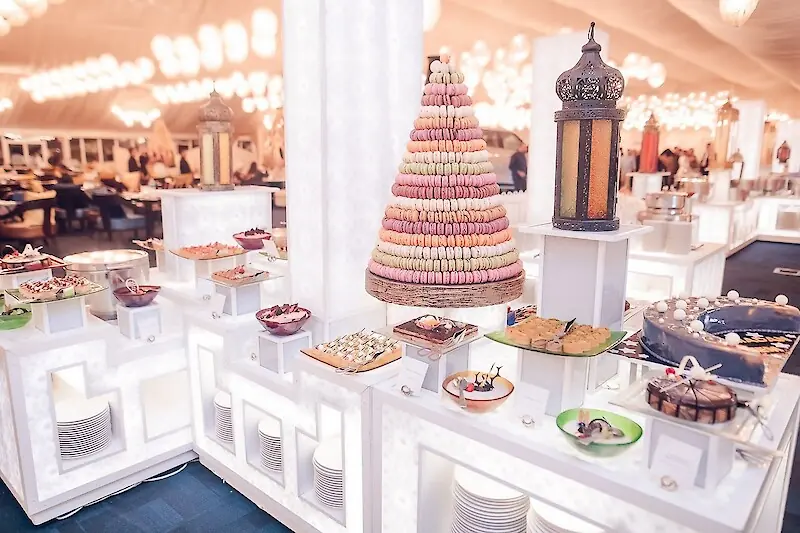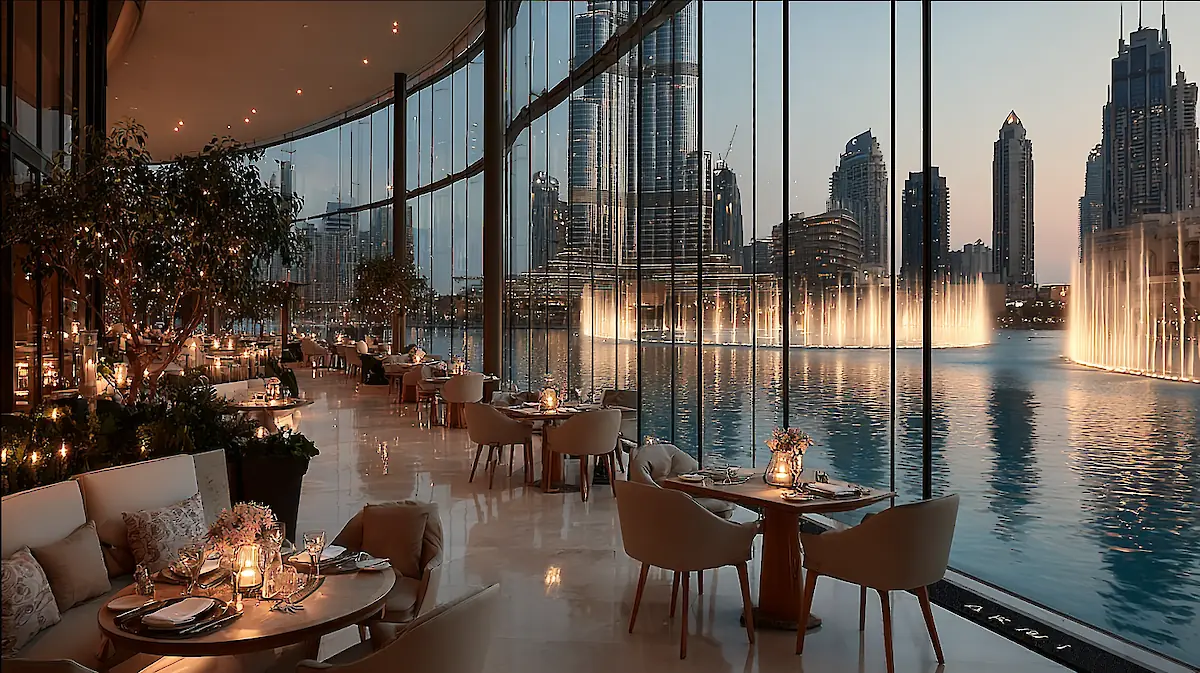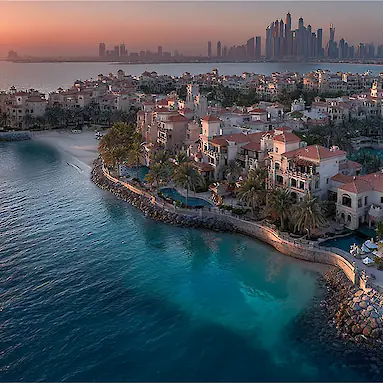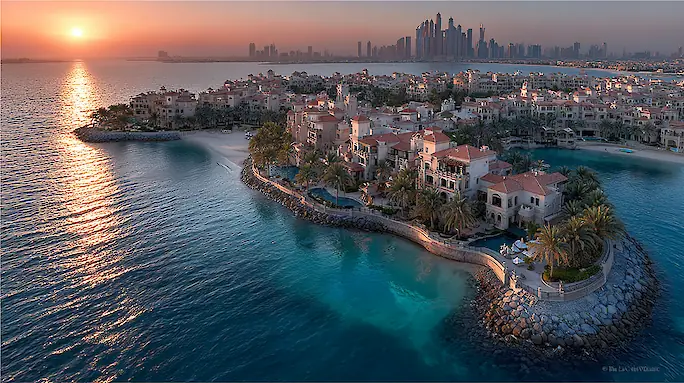A guide to Dubai’s most memorable Iftars and Suhoors: from royal splendor at Atlantis, The Palm, to cozy majlises in the Old Town.
For one month, forget Dubai as the capital of skyscrapers and records. During Ramadan, the city sheds its business attire, slows down its frenetic pace, and reconnects with its roots. As the sun sets, the hum of highways gives way to the clinking of cutlery and the murmur of voices emanating from Ramadan tents—known as "majlises." It's here, not in shopping malls, that the city's true heart beats during this time. Iftar, the evening meal to break the fast, and suhoor, the pre-dawn meal, are far more than mere meals. They're a full-fledged ritual, a theater of hospitality, and an occasion to gather with loved ones. But how can a tourist navigate this diverse landscape—from the regal tents of Atlantis to tiny home-style cafes in Deira? This guide is your compass through Dubai's most delicious and soulful month. We'll show you where to find that very "perfect iftar."
How we chose the best spots: Our guide's criteria
How do you distinguish an authentic Ramadan tent from a tourist trap? We've done the hard work for you. Here's our checklist, used to select the very best:
- Spirit and flavor: We sought out places where Ramadan is truly felt, not merely simulated—in the décor, the music, and most importantly, on the plate.
- Public acclaim: We listened carefully to feedback from real guests and respected critics. Reputation matters.
- That very "special something": Whether it's a view of the Burj Khalifa lights or a live performance by a master of the oud, our list features only venues with character.
- A fair deal: Luxury should be justified, and comfort should be affordable. We’ve sought out a balance where every dirham contributes to your unforgettable experience.
A review of Dubai’s finest Ramadan tents
Luxury icons: five-star Iftars
If you want to experience Ramadan in all its splendor, start with the legendary tents at iconic hotels. Venues like Asateer at Atlantis, The Palm, or the tent at Madinat Jumeirah—are not just dinners, but gastronomic spectacles. Everything here is designed to amaze: the grand scale, the décor, the diversity of dishes, and the impeccable service. This is the choice for those who want to turn their evening iftar into an event that will be remembered for a lifetime.
Name: Asateer Tent at Atlantis, The Palm
Ambiance: It overwhelms you with luxury even before the first dish is served. You’re not entering a tent—you’re stepping into a veritable banquet hall fit for a fairytale sultan: ceilings soar high above, draped in heavy fabrics, while the air hums with the live sounds of the oud and the delicate fragrance of bakhoor. Light from hundreds of intricately crafted lanterns scatters across marble surfaces polished to a dazzling shine, making it seem as though the very air here is woven from golden threads.
Cuisine: A culinary theater unfolds across dozens of stations. The journey begins with a mountain of freshly prepared meze and salads, continues at the chefs’ stations where shawarma is grilled and saj flatbreads are baked right before your eyes, and culminates in the pièce de résistance: a whole lamb uzzi, so tender that the meat falls apart at the slightest touch. In addition to Middle Eastern classics, you’ll also find sushi, oysters, and a dessert table capable of driving any sweet tooth wild.

Key information: price: From 260–320 AED per person. Dress code: Elegant modesty (shoulders and knees covered). Reservation: Required, preferably several weeks in advance. Perfect for: An evening destined to become a lifelong memory.
Modern chic: Iftars with panoramic views
For those who appreciate the pulse of a modern metropolis, Dubai offers iftars at breathtaking heights. Restaurants and terraces in Downtown, DIFC, or Dubai Marina transform this traditional meal into a stylish event set against futuristic landscapes. Here, classic recipes receive bold, original interpretations, and instead of traditional melodies, you’ll hear sets by cutting-edge DJs. This is Ramadan, reimagined in a high-tech style.
Name: Iftar at Ce La Vi Dubai
Atmosphere: The view is what truly matters here. Through panoramic windows or from an open terrace, nighttime Dubai unfolds before your eyes like the palm of your hand—sparkling clusters of lights, soaring spires piercing the sky, and, of course, the radiant Burj Khalifa. The interior design is stylish minimalism, and the atmosphere is relaxed lounge. Here, the sacred tradition of Iftar unfolds against a backdrop straight out of the future. You savor dates and laban while watching the lights of the Burj Khalifa ignite, and the call to prayer mingles with the gentle lounge melodies spun by the DJ. This is Dubai’s Ramadan in the 21st century—contrasting, stylish, and unforgettable.

This restaurant is renowned for its avant-garde approach to tradition. Their signature Iftar dish is dates stuffed with tender goat cheese and truffle honey. A bold and unexpected flavor that perfectly captures the spirit of modern Dubai.
The Soul of tradition: authentic Iftars and Suhoors
To hear Ramadan’s true voice, you must veer off the tourist trails and venture into the labyrinthine streets of historic neighborhoods like Al Fahidi. Here, far from the glitz and hustle, in family-run restaurants and traditional majlises, you’ll find not just a meal, but genuine Emirati hospitality—generous, unhurried, and deeply heartfelt.
Name: Majlis Al Fahidi Majlis
Atmosphere: Forget about skyscrapers. Here, in the maze of old city alleyways, time truly flows differently. Instead of air conditioners—coolness from clay walls and windcatcher towers, or bâdjîls. Instead of chairs—soft cushions on the floor, onto which you just want to sink and forget all about rushing. Instead of background music—hushed conversations and the gentle clinking of small coffee cups, or finjâns, which the host will keep refilling again and again until you gently shake your cup as a gesture of gratitude. This is what true, non-touristy Ramadan really feels like.

To fully immerse yourself in this atmosphere, come for suhur. This pre-dawn meal begins late at night and lasts almost until dawn. There are hardly any tourists around, allowing you to witness local families relaxing, enjoying each other’s company, smoking shisha, and playing board games.
How to choose your perfect Iftar: A quick comparison
To help you quickly find exactly what you’re looking for, here’s our handy cheat sheet:
- Looking for romance and a wow factor? Opt for venues like Asateer Tent or modern spots such as Ce La Vi Dubai or At.mosphere, Burj Khalifa]
- Dining with family and children? Check out Fort Island Tent at Madinat Jumeirah or family-friendly hotels like Rove Hotels Iftar.
- Want to dive into the local culture? Choose Al Fahidi Majlis, Al Khayma Heritage Restaurant, or Arabian Tea House.
- Your main goal is to snap Instagram-worthy photos? Look for terraces such as Ce La Vi Dubai, Address Sky View Terrace, ZETA Seventy Seven, Address Beach Resort, or At.mosphere, Burj Khalifa.
Planning your visit: Practical tips
The essentials of Ramadan: dates and seasonality
Remember that Ramadan is the ninth month of the Islamic lunar calendar, and its dates shift backward by 10–11 days each year. Always confirm the exact dates before planning your trip. All tents, iftar menus, and special offers we mention are valid only during the Ramadan period.
Rule #1 During Ramadan: book in advance
Iftar is the evening’s main event, and the best spots get snapped up faster than hot pastries. To avoid being left without a table, especially on weekends (Friday through Sunday), book well in advance. Most venues accept online reservations via their websites or popular booking platforms.
Failed to book? You’ll go hungry!: The most popular tents are fully booked 1–2 weeks in advance, sometimes even earlier. Don’t delay your booking if you don’t want to spend your evening searching for an available table.
Dress code and etiquette
Ramadan is a time for respecting traditions. When heading to iftar, opt for elegant yet modest attire. A simple rule for both men and women: shoulders and knees should be covered. A small but significant gesture of respect towards those who are fasting: wait for the evening prayer call (adhan), which signals the start of the meal, and only then begin eating.
Budget: what to expect
The cost of iftar in Dubai can vary significantly. Here are some approximate guidelines:
- Authentic and budget-friendly spots: 60–120 AED per person.
- Mid-range and contemporary restaurants: 180–300 AED per person.
- Luxury five-star tents: 260–600 AED and above per person.
Prices are subject to change. Always confirm the final price when making your reservation.
Timing and transportation
Iftar begins immediately after sunset, a time that shifts by a couple of minutes each day. The most convenient way to reach your destination is by taxi or ride-sharing. In the evenings, parking lots at popular hotels and restaurants are completely full, so driving your own car might add unnecessary stress.
Check the exact sunset time on the day of your visit and arrive 15–20 minutes before it starts. This way, you can calmly find your table, take in your surroundings, and fully experience that magical atmosphere of anticipation that makes iftar so special.
Conclusion
Attending iftar in Dubai means seeing the city without its glossy sheen, experiencing its genuine, heartfelt side. This is a rare experience where haute cuisine, ancient traditions, and genuine human warmth come together at one table. You can choose a luxurious tent or a modest majlis, but either way, you’ll receive much more than just a meal—you’ll experience a genuine taste of authentic Arab hospitality. We hope our guide will help you find your perfect spot in this celebration of life. Enjoy your discoveries, and may your Ramadan be generous and blessed! Ramadan Kareem.























Comments